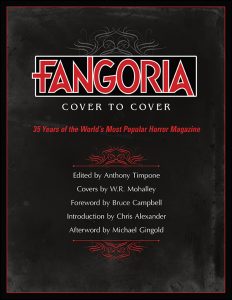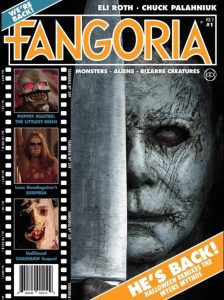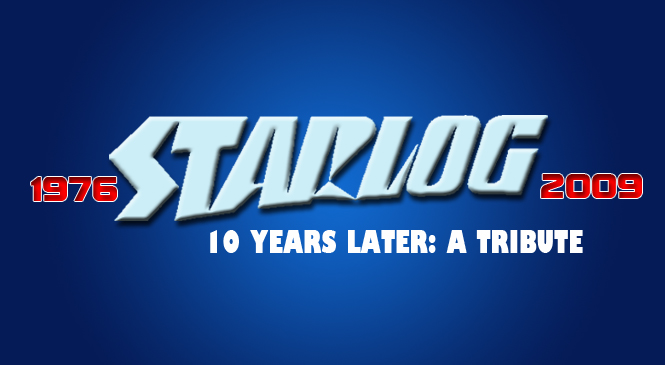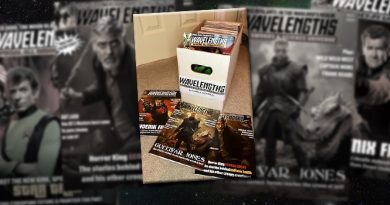Tony Timpone: The FANGORIA Years – Part Two

In 1985, Tony Timpone started the job most horror film fans would have sawed their own legs off for – well, someone’s leg, anyway, especially if it was on a film set.
Tony Timpone was working for Fangoria.
“I’d love getting up to go to work. It was a dream job, so it was always constant fun. I mean, it was a lot of work because – especially when I first started out – Fangoria sales weren’t that good, and the magazine was actually on the verge of cancellation at one point. Than Dave Everitt left that summer, the summer I started, after about a month. I was 22 years old, so I was too young to actually inherit the magazine, but what they did was, Dave McDonnell, who was editor at the time, he came up with this plan that he would edit the magazine for a year until I got my wings, and then I would become editor-in-chief.”

Of course, while it was work – one does not just become editor of what would become the premiere horror magazine without putting in the hours – Timpone’s love for the job did take him from editorial assistant to Editor-in-Chief in that short year.
“A typical day at Fangoria was: you come in, you always look forward to opening the mail because you’d always get lots of good stuff in the mail. Free books or videos or posters or the articles that you had to edit for the day, they would come in the old way through the United States Postal Service. And if an issue was in production, I’d have to put together folders, pick out the photos… you know I picked out every single photo that was in the magazine. I’d have to decide what movies we were covering in that issue, what TV shows, come up with the contents of that issue. I would deal with publicists to get my writers on the sets of movies, or to get them set up to interview various personalities. Calling up the photo department at Universal or Warner Brothers to get some of the pictures we needed. Once a month we’d have a cover line meeting with our boss Norman Jacobs, the publisher. That was really pretty much the only time we met with him. And Norman really didn’t care what you put inside the magazine for the most part, but he always had to have a say on the cover and the lines – the comp lines – that we used to sell the issue.”
Alongside Kerry O’Quinn, Norman Jacobs was the creative force behind Starlog and Fangoria. The two of them started their own publishing company in 1972 with Daily TV Serials, a soap opera-focused magazine, because soap operas were, at the time, incredibly popular. It was successful, but they were science fiction fans, and when O’Quinn suggested they create a serious science fiction magazine, Jacobs happily agreed. Their distributors weren’t as happy about it, and the somewhat famous “Star Trek is Dead” line that readers of Starlog may recognize meant that some persuasion was necessary. Wearing them down with actual information about the depth and breadth of fandom, Jacobs and O’Quinn launched Starlog as a quarterly in 1976, and sales were so good that they were monthly by 1977.
“[Jacobs] had a good eye and saw what sold, and knew the best way to market the issues, so you know those those meetings were always pretty enlightening. He’d play with the lines a little bit on the cover and change this or that, but for the most part he was a great collaborator because he gave me and my managing editor a lot of freedom to do what we wanted with the magazine. So that was always a good thing. And other things you would do as editor was go advance screenings of upcoming movies. And as Fangoria continued to grow we started getting involved in other things; film production, conventions, books and all these different offshoots of Fangoria. In the mid 80s, shortly after I started, the circulation exploded because the Nightmare on Elm Street movies got really popular. Freddy became a household name and we found every time we put Freddy Krueger on the cover our sales went through the roof. So we we were in a really good place in the 80s. We had a really good run there.”
And they had access. In magazines like Starlog and Fangoria, fans got pages of interviews with actors, directors, production designers and composers. Reports from set visits and behind the scenes photos whet the appetite of fans months before the films and televisions shows covered would hit the screens, large and small. Fangoria went deep into the genre, and fans knew that if you wanted to hear the words of John Carpenter, Tom Savini, Rick Baker, Robert Englund and so many more, they would find them in those pages.
“You really got to spend a lot of time, a good chunk of time, a minimum of an hour. Now I’ll interview somebody and you have ten minutes, you have 15 minutes, 20 minutes tops, and you know, unless you’re like Vanity Fair where the reporter spends the whole day with the celebrity, and they go with them to the dry cleaners, and to pick up their dog at the kennel, and the kids at school, and go shopping, and they follow them around the whole day. You know these studios, with the genre magazines, you know that they’re basically just throwing scraps to them. ‘You got 10 minutes with…’ I did an interview with Mads Mikkelsen, who had just done this comic book adaptation, and they gave me 10 minutes with him, and there’s not much you could ask in 10 minutes, you know, so that’s frustrating. But the ‘old’ days, you know, you do these interviews and you’d be on the phone with them a good chunk of time. You know, you really got to know them and do these thorough retrospective articles and things like that. And today journalists insist they have to see the movie before they do coverage. Back then, you know, you’re lucky if you just get production notes, and you were pretty much flying blind when you were covering new films.”
For all that Timpone loved his job, the success of Fangoria opened the space for new opportunities.
“When I stepped down as editor I moved over to managing the company’s Video on Demand division. For many years I used to manage our DVD line so this was a natural progression of that where I would be, you know, selecting movies for people to watch in their homes.”
That management included Fangoria’s own films, back in the 90’s, which Timpone was instrumental in bringing to the screen. The first was MINDWARP, starring Bruce Campbell and Angus Scrimm, and to break the format a bit here, a film which this author remembers with a certain amount of fondness. Children of the Night with Karen Black, and the Oliver Reed starring Severed Ties followed. There were also Fangoria’s Weekend of Horrors and Trinity of Horrors conventions to produce and host, appearances on TV and radio to promote the horror industry, and writing and editing full-length books about the genre.
And then there was Fangoria Radio, which ran from 2006 to 2009. Timpone was a regular host on the show, alongside musician, actor and radio star Dee Snider, and actress, writer and Scream Queen Debbie Rochon.
“Dee kind of, you know, took up most of the air in the room, you know. He was such a big personality, so it took me a while to kind of carve out my space on the show. But by the end it was really the three of us hosting. Those four years were a really great time in my life. It was a three-hour show, and we had just amazing guests every week. And a lot of them in the studio like Bruce Campbell, Mel Brooks, Angus Scrimm, Don Mancini, Clive Barker, Quentin Tarantino. We had no problem booking guests, because everybody wanted to be on Fangoria Radio. It was just an amazing experience, and yeah it’s a shame, because the four years we were on were like some of the best years of my creative life. It was a great time.”
 “So the editing of the magazine went over to Chris Alexander, and I concentrated on that for a number of years. And also around you know we did a screening program where we show advanced horror movies for free in various cities and I managed that. I still had my hands on a whole bunch of different Fangoria things, like editing a Fangoria book Cover to Cover during that period, but the day to day operations of editing the magazine were no longer mine. Which was kind of a relief, because at the time the magazine started having financial problems, the new owners were mismanaging things, and the writers weren’t getting paid. So that was a big nightmare.”
“So the editing of the magazine went over to Chris Alexander, and I concentrated on that for a number of years. And also around you know we did a screening program where we show advanced horror movies for free in various cities and I managed that. I still had my hands on a whole bunch of different Fangoria things, like editing a Fangoria book Cover to Cover during that period, but the day to day operations of editing the magazine were no longer mine. Which was kind of a relief, because at the time the magazine started having financial problems, the new owners were mismanaging things, and the writers weren’t getting paid. So that was a big nightmare.”
And then it was over.
The final print issue of the original run of Fangoria was #344, published in October of 2015. The previous two years had been chaotic, with the exit of Alexander as Editor-in-Chief, and Managing Editor Michael Gingold succeeding him and then being fired eight months later. Gingold had been with the magazine for twenty-eight years, and this set off an uproar in the readership. Former Managing Editor Ken Hanley took over to oversee the release of a few digital issues, but it was clear that things were not going well. On February 11th, 2017, Hanley took to Twitter to announce that he had been on hiatus from the magazine since the end of 2016, and that there would be no more new issues of Fangoria.
“It was very depressing, because I saw how much the magazine meant to people and to see it falling by the wayside and things falling apart. Seeing how the industry was changing… we were losing circulation because a lot of information on new films would scoop us on the web before we could even get published. It was would say seeing the business changed so much. And then all of the magazines ceased publication. It was… it was really sad. It was the end of an era. The conventions stopped and this was such a life love for people, we inspired so many people, to see that go away… It was sad, but you know all good things must come to an end. I suppose I accepted it, and luckily I continued to work in horror and and still be a part of the industry so at least. So that was very gratifying, and it’s still gratifying. But in my heart I always wanted to see Fangoria come back in some form.”
 A year later, it did, when Cinestate bought Fangoria and announced that not only would the magazine come back, but it would be back as a print magazine, standing out against the industry trend to digital platforms. The internet would not be ignored, of course, but it would accentuate the printed Fangoria, not supplant it. And in October of 2018, Fangoria: Volume 2, Issue 1 was published. Alongside new Editor-in-Chief Phil Nobile Jr. – former Editor-at-Large for the online Birth.Movies.Death – and a host of new writers, Timpone returned as well, as Editor Emeritus. Michael Gingold also returned.
A year later, it did, when Cinestate bought Fangoria and announced that not only would the magazine come back, but it would be back as a print magazine, standing out against the industry trend to digital platforms. The internet would not be ignored, of course, but it would accentuate the printed Fangoria, not supplant it. And in October of 2018, Fangoria: Volume 2, Issue 1 was published. Alongside new Editor-in-Chief Phil Nobile Jr. – former Editor-at-Large for the online Birth.Movies.Death – and a host of new writers, Timpone returned as well, as Editor Emeritus. Michael Gingold also returned.
“I’m a consultant on the magazine and so I contribute articles, and I also have a column on every issue called Elegies which is sort of an offshoot of my old editorials, where the new owners and editor basically give me carte blanche to write whatever I want each issue, which is great. The first few columns I talked about my early days with the magazine and it’s been really nostalgic for me reliving a lot of that stuff. And the magazines in great hands! Cinestate, the people who own the magazine now, have good taste and good business people. And they also make movies – they make really, really good movies – like Dragged Across Concrete and Bone Tomahawk and Brawl in Cell Block 99. They did the new Puppet Master. They have a film coming out this summer called Satanic Panic, and another one that just wrapped called V.F.W. So they’re now they’re living the dream, and they’re making horror movies, and they bought Fangoria back in a big way. Things couldn’t be better.”
Of course, with the return of Fangoria, it begs the question of the return of Fangoria Radio and its star-laden program. Unfortunately, as much as he’d love to do that show again, logistically and financially, it might be too difficult to be practical.
“Dee is in Las Vegas, Debbie is in Canada, and I’m in Brooklyn. Right now Fangoria is concentrating on the podcasts. We took over Mick Gariss’ Post Mortem, and Becca McKendry, who’s been associated with the magazine and Fangoria Radio for many years, is doing a podcast that launches very soon called The Nightmare Academy. I think that’s kind of the future in terms of those kind of things.”
The timing of the return of Fangoria couldn’t be better. The horror genre is experiencing historic success across all media, with films like Get Out, The Witch, Let the Right One In, The Babadook, It Follows and Hereditary receiving critical acclaim alongside box office success. Horror comics like The Walking Dead, 30 Days of Night, and American Vampire win awards and readers, while American Horror Story, Hannibal, Penny Dreadful and Bates Motel cross the network and premium television platforms.
“Oh, I like The Witch a lot. I like It Follows. Let’s see. Those are two, and Hereditary. I like a psychological horror. And I also like horror that moves me on an emotional level. Yeah. And I like comedic horror too. As an example I just saw a funny a thriller at the Tribeca Film Festival called Come to Daddy. That was a lot of fun.
“I like this movie called I Am Not a Serial Killer. I thought that was really good, with Christopher Lloyd. I liked The Autopsy of Jane Doe. I thought that was terrific. Yeah. And then the Japanese horror movies, you know, in the early 2000s, The Ring and The Grudge. I thought those were really refreshing and exciting. It’s a great time to be a horror fan. There’s just so much stuff at our fingertips now with streaming, with theatrical, with TV. It’s unbelievable. You know, when I was growing up, you were lucky to have one horror show on the air, and generally it would last maybe one season. If the ratings were good. Now there’s no Harvard shows on every network and every platform. It’s an impossible thing to keep up.”
Fangoria is going to try, of course. And Timpone is going to be there with it.
“I see Fangoria doing more and more movies, and probably getting back into video on demand. The owner also has a book imprint – they publish books – so I see more books coming out of Fangoria and I’m hoping to see a TV show with the Fangoria name on it in the near future. I’m hoping the magazine will increase the frequency to six times a year, because the new editor Phil Nobile Jr. is having trouble squeezing everything into those quarterly issues, so it would be great to see it coming out six times a year. So, yeah, I think that the future’s pretty bright. People have really embraced the new Fangoria, they want to be part of it, and again, the magazine is being run the right way, with great people at the helm, so things are looking good.
And to be part of it again, it’s a real joy.”
![]()




